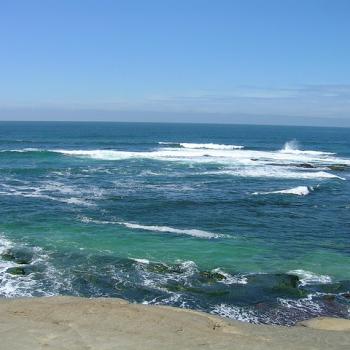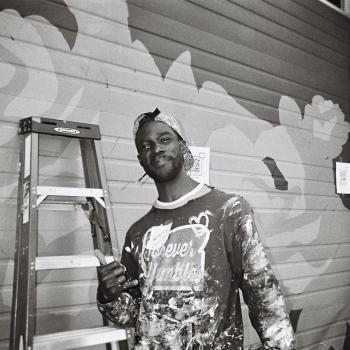Lectionary Reflections
Luke 3:7-18
December 16, 2012
Mayor John Rothschild's "Welcome to Tucson!" Speech
I'm sitting in the Tucson international airport waiting for my plane to Dallas that was delayed an hour and 45 minutes. Every five minutes or so, they play a recording of Mayor Jonathan Rothschild welcoming us to Tucson. He has a very pleasant voice:
Welcome to Tucson! This is Mayor John Rothschild. Tucson is a modern metropolis with a 4,000-year history. Tucson is the home of the University of Arizona, whose researchers recently led a mission to Mars. Tucson is nicknamed "Science City" for its many industries related to information technology, optics and solar power. Experience our authentic Southwestern culture: arts, music, great food and shopping. And we're known for our warm hospitality. Again, welcome to Tucson, and we hope you enjoy your stay!
My husband, Murry, and I have spent the weekend in Tucson caring for matters related to his recently deceased Aunt Kathryn's estate, of which he is the executor. I was already favorably disposed to Tucson because of the gorgeous mountains. But now that the mayor has welcomed me to his city so warmly, maybe I should consider moving here...
Our Advice to John the Baptist on Rewriting his "Welcome to Advent!" Sermon
John the Baptist could have taken a page out of Mayor Rothschild's upbeat book in his greeting to the crowds that came down to the Jordan River for baptism. John's manner and general demeanor do not offer a Chamber of Commerce-type welcome to those seeking baptism. Nor do they offer a warm welcome to the Advent season. John's approach is radically out of step with our world and its cultural celebration of the season of Advent.
Maybe somebody needs to give John a "Welcome to our World" message, offering him advice on how to be successful with contemporary cultural contexts:
Dear Wild Man, Wilderness Baptizer:
Here is what you need to know about our world in order to be successful with your message. We are not accustomed to having our noses rubbed in the fact that our motivations for participating in Advent may be corrupt or at least shallow (Luke 3:7ff). We prefer inhaling the scent of cranberry candles. We are not used to hearing that whether we are ordinary citizens, soldiers or tax collectors, we are called to sacrifice in this season and not engage in self-indulgence (Luke 3:10-14).
Welcome to our world, John. In our world, preparing for the Advent involves practical advice on how to avoid holiday weight gain, decorate on a tight budget, prevent a gift-giving faux pas at work, and whiten our teeth for all those holiday parties. Encourage us to give a toy to a tot, put a coin in a red kettle, and buy a goat for a village we'll probably never visit. Even urge us to engage in moments of grateful reflection on God's goodness in coming to earth. Remember the old saying: "You get more flies with honey than with vinegar."
John the Baptist's Push-Back
We might like John to gather us around the manger and lead us in singing the opening verse of Chris Rice's beautiful song, "Welcome to our World:"
Tears are falling. Hearts are breaking.
How we need to hear from God.
You've been promised. We've been waiting.
Welcome, Holy Child. Welcome, Holy Child.
It is a beautiful song with lovely lyrics. But John is not about gathering us around the manger. He's about delivering a "Welcome to Advent" sermon that shakes our nativity snow globe so hard it cracks and all the water flows out along with the little white coconut flakes. The baby has escaped from the hermetically sealed snow globe of our cultural Christmas.
John is about welcoming Jesus to the Jordan River and the people standing by it. The crowd who stands listening to John wonders, "Is John the Messiah?" (3:15).
Oh no, my friends. We are not about to get off that easy. At Advent we don't just welcome to our world a prophet who tells us the truth about ourselves and baptizes us with water to symbolize our repentance. We welcome a baby grown to a man, a crucified and resurrected Savior who comes with mercy, but also with judgment. He comes with the Holy Spirit's burning power and a winnowing fork in his hand. Herod didn't like the sound of this coming competitor, so he gave John the welcome despots always give to prophets. He said, "Welcome to my world, John," by shutting John up in prison (Luke 3:20). Perhaps Herod thought that would be the end of this Messiah business.
But it's too late. The baby has already been born.
The child has already grown and become strong (Luke 2:40). God's wisdom, power and healing have already been unleashed and are about to be witnessed in Jesus' teaching, exorcisms and healings. Those who open their hearts to God with generosity and justice are about to be forgiven and empowered. And those who reject God and God's Son? Well, they are what winnowing forks are for. They are the dross that will be burned away. Even as John the herald offers his acerbic sermon, we can hear the approaching footsteps of Jesus the Savior.





